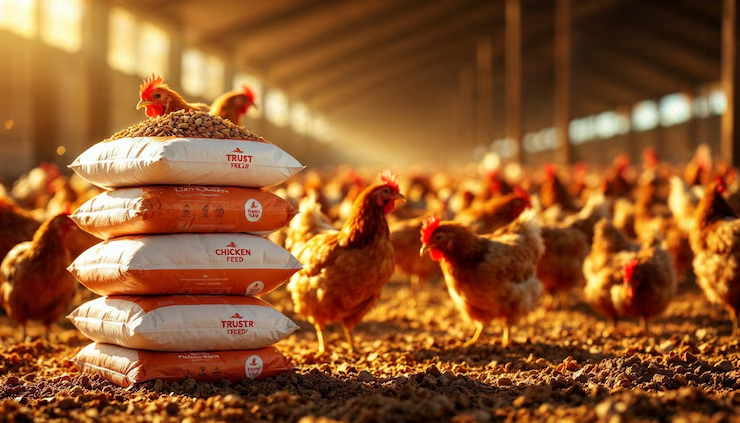What’s in a Feed?
Ever wonder what makes poultry grow fast, lay strong-shelled eggs, and stay healthy? Sure, proteins and minerals play a big role, but vitamins in poultry feed are often the unsung heroes.
Think of them as tiny powerhouses—small in quantity, massive in impact.
Whether you’re raising broilers for rapid growth or layers for consistent egg production, vitamins can make or break your flock’s performance. But here’s the twist: broilers and layers don’t need the same vitamins in the same way. Let’s dig into the details.
The Vitamin Breakdown: What Are They?
Vitamins are like backstage crew members in a play. They’re not always visible, but nothing works without them.
They’re grouped into two types:
- Fat-soluble: A, D, E, and K
- Water-soluble: B-complex (like B1, B2, B6, B12), C
Each has its own job. Some strengthen bones, others protect from stress or boost immunity.
Your feed would essentially be like pizza without cheese if you didn’t have these. You can eat it, but it won’t hit the spot or in this case, support peak poultry performance.
Key Vitamins That Rule the Roost
Let’s take a quick tour through the vitamin hall of fame:
- Vitamin A: The superhero for eyesight and immune health. Also great for skin and mucous membranes think respiratory protection.
- Vitamin D3: The “bone boss.” Without it, calcium just doesn’t do its job. Essential for strong legs in broilers and firm eggshells in layers.
- Vitamin E: Nature’s antioxidant. Keeps fertility rates up and muscle health in check. Especially helpful for male breeders and during stressful transitions.
- Vitamin K: Helps blood clot properly. Also aids bone development no one wants chickens with wobbly legs.
- B-complex Vitamins: These are the energy drivers. They help convert food into fuel, support the nervous system, and encourage good feathering. B1, B2, B6, B12, niacin you name it, they all pitch in.
- Vitamin C: A lifesaver in times of stress, although not strictly necessary for birds.. Helps reduce heat stress and boosts the immune system, especially in tropical climates.
Broilers vs. Layers: Who Needs What?
A broiler’s life is short but intense. They grow fast, so they need more of the energy-producing and bone-building vitamins like B-complex and D3.
Layers? They’re marathon runners. Their bodies need constant supplies of Vitamin A, D3, and E to keep the egg factory running smoothly and shells hard enough to avoid cracks.
So yes, both need vitamins but their “vitamin diet” is very different.
What Happens Without Enough Vitamins?
You know that scene in every survival movie where the hero gets scurvy and things go downhill? That’s what happens to poultry when vitamin levels drop.
Expect:
- Stunted growth
- Feather loss
- Weak immunity
- Poor bone development
- Thin eggshells
- Reduced egg production
- Even higher death rates
Sounds dramatic? It is.
Premixed Vitamin Solutions
Here’s where science saves the day.
Modern commercial feeds often use vitamin premixes carefully balanced blends that ensure every bite your bird takes contains exactly what it needs.
At Katre Premix Lab, we prioritize uniformity, bioavailability, and quality control. Because when it comes to vitamins, more isn’t always better right dosing is everything.
Premixes make life easier. No guesswork. No mixing errors. Just results.
How to Choose the Right Vitamin Premix?
Not all premixes are made equal.
Go with trusted suppliers like Dr. Katre Premix Lab—consistency matters.
Customize based on age, breed, and production stage. A chick doesn’t need the same premix as a laying hen.
Talk to experts. Veterinary nutritionists can help tailor the perfect blend.
It’s not just about ticking a box. It’s about investing in the health and performance of your birds.
Wrapping It Up: Don’t Skip the Vitamins!
So, what’s the bottom line?
Vitamins in poultry feed are not optional. They’re fundamental. From better growth to stronger immunity and higher egg yields, the benefits are too big to ignore.
Want to improve your flock’s health and performance?
Choose a premix that’s tailored, tested, and trusted.


